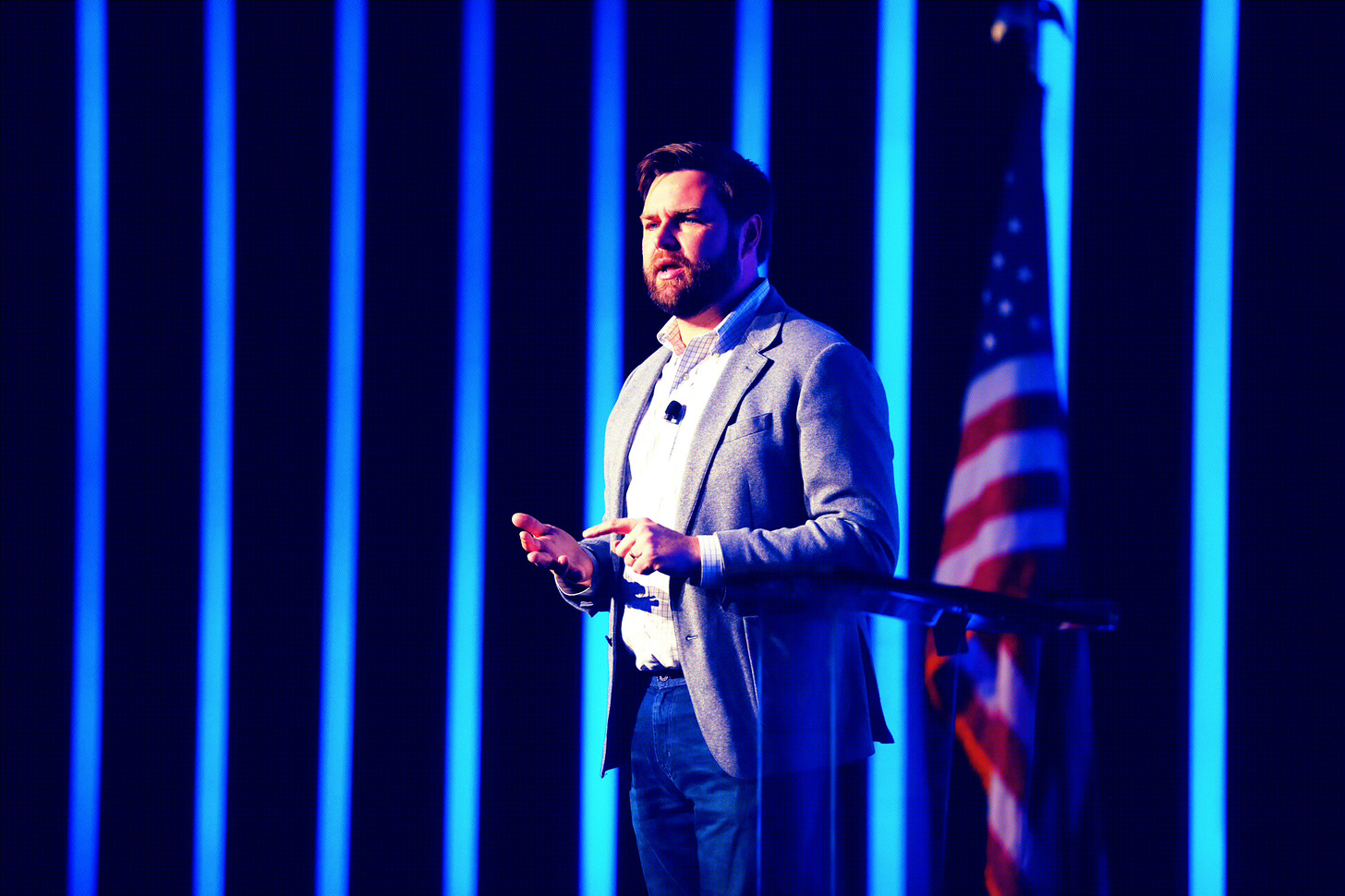JD Vance Is Ready to Remake America in MAGA's Image
Trump's VP pick combines ideological zeal with a willingness to use the state to quash political enemies who stand in his way
With Republican presidential nominee Donald Trump selecting Sen. JD Vance of Ohio as his running mate, the 2024 Veepstakes have officially come to close. Vance, who rose to prominence after writing the best-selling memoir Hillbilly Elegy, is easily the most overtly ideological option for running mate from the reported final shortlist that included North Dakota Gov. Doug Burgum and Florida Sen. Marco Rubio.
Vance was once a staunch critic of Trump, an avowed “Never Trumper” (going so far as to pledge his vote to Evan McMullin in 2016), and even mused that the man might be “America’s Hitler.” A couple of months after Trump was sworn in as president, Vance wrote in a since-deleted tweet, “In 4 years, I hope people remember that it was those of us who empathized with Trump's voters who fought him most aggressively.” Four years later, Vance completely changed his tune about Trump, telling Megyn Kelly he voted for him in 2020. By the time Vance decided to seek a seat in the Senate ahead of the 2022 election, his about-face was complete. Vance’s U-turn on Trump paid off when the former president endorsed Vance in a closely fought Senate primary, and finally propelling Vance to the nomination. As Marc Caputo reported at the time, “J.D. Vance looked like just another Ohio also-ran in the crowded GOP Senate primary. Then Donald Trump decided to get involved.”
But while Vance’s initial embrace of Trump’s cult of personality might be of dubious sincerity, his embrace of Trumpism as an ideology is not. For years, Vance has eagerly touted the avowedly illiberal “National Conservative” framework, speaking at its flagship conference, becoming fluent in its lingo and premises, and distinguishing himself as one of the most prominent avatars of our era’s new right-wing populist authoritarianism.
Since Trump’s politics have always relied on his inchoate instincts and impulses, rather than on adherence to a coherent ideological system, he has tended to be malleable on a number of issues and policies; he’s no political philosopher, to put it mildly. One of his few consistent positions, though—and this dates back decades—is his anti-trade protectionism, one of the hallmarks of the NatCon movement today. Still, for the most part, Trump will shamelessly flip-flop on any issue in service of his own populist brand of strongman personalism—as his abrupt switch on banning TikTok shows. Vance, on the other hand, is the best window we have into what the post-Trump GOP genuinely believes and what it will likely look like.
Trump’s choice of Vance goes a long way to ensuring that the future of Republican politics, much like its present, is firmly committed to populist authoritarianism. Vance’s brand of conservatism requires fully, and eagerly, discarding the old fusionist framework with its rhetoric of free markets and less government intervention in the economy, and its general commitment to liberal democracy. In its place is an unabashedly statist social vision, prioritizing the will to power, where politics is nothing more than a zero-sum game of deciding who will dominate whom.
Powered By National Conservatism
Vance's political journey is marked by his transition from a Trump critic to a Trump enthusiast, but his underlying beliefs have remained relatively consistent. Unlike Trump, whose appeal largely rests on his personal charisma and public persona, Vance's worldview is firmly rooted in the principles of National Conservatism. This movement, gaining traction among conservative intellectuals and policymakers during the Trump era, advocates for a strong, interventionist state that prioritizes what it perceives as national interests. While this includes a kind of economic populism, speaking more positively of the welfare state and denouncing free trade as “globalist,” it is more fundamentally built on a hardline socially conservative stance.
Indicative of the overall tone of Vance’s style is a telling speech he delivered to the 2019 National Conservative conference, later published in the conservative Catholic journal First Things.
[W]e know that at least one of the causes of this is that we have allowed pornography, under the guise of libertarianism, to seep into our youngest minds through the channels of the Internet. Again, we made a political choice that the freedom to consume pornography was more important than public goods like marriage and family and happiness.
Like much NatCon rhetoric, this description of the pre-Trump GOP, the party of George W. Bush and Mitt Romney, as radical pro-pornography libertarians, is utterly nonsensical to anybody who remembers actual Republican rhetoric during those years. (Or the Democratic Party’s, for that matter. Remember Tipper Gore’s crusade to affix warnings on sexually explicit rap lyrics?) A centerpiece of Bush’s 2004 reelection campaign was a crusade against same-sex marriage, after all. His administration also brought the last gasp of obscenity prosecutions targeting consensual adult pornography. But for NatCons these facts just get in the way of their ability to roll back progressive victories on gay and women’s issues. In order to justify their illiberal designs, they depend on the manifestly untrue narrative that for far too long the Republican Party has been unwilling to use state power toward conservative ends, and has thus allowed social liberalism to run amok.
Vance might say he favors economic populist policies long associated with progressives—he’s advocated raising the minimum wage, for example—but the underlying principle is that these “pro-family” policies could be used to impose a conservative vision of society. Thus, Vance has criticized no-fault divorce, called for a total ban on abortion (now watered down to more closely match Trump’s position), and continues to oppose same-sex marriage. While wrapped in economic rationalization, Vance’s NatCon opposition to immigration and free trade is also of a piece with the overriding principle of rejecting an open, pluralistic society.
Vance’s Counter-Revolution
Vance’s vision of the NatCon revolution is not just a policy agenda; it’s a full-blown purge of lefties from social institutions, a process that he ludicrously compared to de-Nazification in postwar Germany.
In this telling, the commanding heights of America’s institutions have been occupied by the left and must be replaced with its mirror image from the right. While this persecution narrative is untrue—the Republican Party continues to win plenty of elections, wielding power from a panoply of government offices and political institutions, and enjoys the backing of many rich and powerful people, including Vance’s own patron, billionaire Peter Thiel—the fact that broader bases of power including the media, academia, bureaucracy, and the corporate world are not aligned with Vance’s vision puts them all firmly into the enemy class.
Aligned with the vision of the Heritage Foundation’s increasingly notorious Project 2025 (Heritage’s president, Kevin Roberts, praised Vance as his preferred pick for vice president), many of liberalism’s internal checks and balances must be swept aside in favor of what Vance openly calls a “counter-revolutionary” project. Though he didn’t intend it this way, there’s a sense in which this “counter-revolution” regularly invoked by the Vance/Heritage elements within the Republican Party is aimed most squarely at countering the American Revolution and all of its liberal commitments.
Vance has criticized the judiciary for impeding the will of the people, particularly when courts strike down laws and policies he supports, even as the Supreme Court has veered in a radically pro-Trump direction. Invoking Andrew Jackson’s refusal to comply with court rulings he didn’t like, Vance expects a president who will unapologetically trample any constitutional limits on his own power.
Perhaps most troublingly of all, Vance has expressed in no uncertain terms that as vice president he would have rejected Mike Pence’s fidelity to the Constitution and instead assisted in Trump’s effort to steal the 2020 election. Vance cynically wrapped his willingness to help overturn a presidential election in the language of democratic accountability—endorsing “an alternative slate of electors” would have been “a much better thing for the country” because “at least we would have had a debate,” he said in an interview. But behind the appeals to making “an argument to the American people” is an animating conviction that his political movement deserves to be in power at any cost and that his opponents must be kept out of power no matter what. When politics is an existential battle for survival and domination, losing elections is only one more hurdle to be overturned, not a binding outcome to accept.
What the Vance Pick Means For the Future of Conservatism
Vance’s selection as Trump’s running mate signals the final repudiation of Ronald Reagan’s Republican Party and its imperfect but real coalition of free market conservative fusionism. It is also a wake-up call for those still in denial who see Trump as an aberration that will one day pass and hold onto the prospect that there will be a return to “normalcy” eventually. The party of Trumpism is here to say, likely for decades. The old rationalizations for free-marketeers to see themselves as part of the Republican coalition are dead and gone. They have been expelled, and the message from Vance is a firm “don’t let the door hit you on the way out.”
The National Conservative project, with Vance as one of its most eager apostles, has always been to fashion a future of Trumpism without Trump, less dependent on the popularity of a single erratic 78-year-old, distilled to the underlying philosophical commitments of the new right.
In explaining his own ideological evolution, it is perhaps most telling that Vance has invoked Carl Schmitt, the political philosopher who went on to become a notorious jurist in Nazi Germany. Vance did so to describe his political opponents, citing the Brett Kavanaugh confirmation hearings, the Black Lives Matter protests, and his sense that in 2020 “there was nothing you were allowed to say.” But his tactic is clear: He is attributing the Schmittian framework—“no law … just power”—to his political enemies to justify his own embrace of it against them.
The allusion here is to Schmitt’s 1932 book, The Concept of the Political, whose core thesis is politics as conflict, a game of defining friends and enemies and constant warfare between them. As Schmitt put it, “The political is the most intense and extreme antagonism, and every concrete antagonism becomes that much more political the closer it approaches the most extreme point, that of the friend-enemy grouping.”
In this worldview, there are no political opponents, only enemies. And if they need to be manufactured by exaggerating, distorting, and catastrophizing those on the other side of the political divide, then so be it.
This Schmittian vein to National Conservatism, more than its specific policy prescriptions, is at its core a rejection of the liberal vision of cooperation, pluralism, and the possibility of governance of society as a positive-sum game in which all can be made better off. And now, next year, this vision may well be a heartbeat away from the most powerful office on Earth.
© The UnPopulist 2024









J.D. Vance certainly looks like a surly insurrectionist thug from Hillbilly Hollow these days. Downright dangerous.
I began by reading Ross Douthat’s interview with Vance a week or so ago (it’s excerpted from an old interview, not recent), then listened to Vance’s interview with David Axelrod for his podcast The Axe Files which is seven years old. Both gave me the impression of an intelligent, well-spoken, and fairly reasonable man. Then I listened to his RNC speech from this week, which is basically just pep rally stuff with not much policy. The one take away is that Vance, like Bannon, is obsessed with the loss of American manufacturing and basically attributes most ills to that. He made the false claim that wages soared under Trump, which is simply untrue by any measure I can find and certainly untrue in constant dollars ( https://www.pewresearch.org/short-reads/2018/08/07/for-most-us-workers-real-wages-have-barely-budged-for-decades/).
He has also adopted cultural conservatism that may not be sincere. There are numerous inconsistencies in his rhetoric. One, he decries Wall St. elites as villains even though he owes his own financial security and political backing to Wall St, notably Peter Thiel. His ongoing connection to Thiel, who is a gay, also makes his anti-gay marriage position curious. Even more curious is his anti-immigrant discourse given that his wife is Indian American from a Hindu family, while Vance, a Catholic convert, emphasizes Christian traditional (read reactionary) values.
Intelligent as he is, all this opportunistic shuffling of positions to fit the moment makes him very untrustworthly.